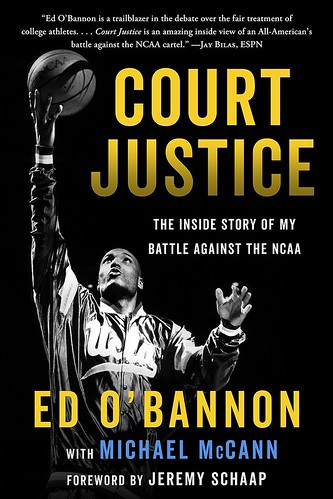-
Administrator

O'Bannon: How College Sports Games Could Return
As part of Court Justice: The Inside Story of My Battle Against the NCAA by Ed O'Bannon and Michael McCann, O'Bannon fires back at what he calls a ridiculous claim: that he is to blame for the end of college sports video games and namely the NCAA Football franchise.
"But the video game comment was the one that I got the most. To be honest, it kind of caught me off guard since it was so wrong and so ridiculous. Yes, itís true that Electronic Arts stopped publishing college sports games after we led my lawsuit, but letís think about the facts for a moment. ...
"If the NCAA had let EA pay us, all of you gamers out there would have your college sports games. So donít blame me. Blame the NCAA for refusing to change its rules in the face of basic common sense, not to mention consumer demand."
It is worth nothing that under terms of the settlement, EA did not admit any wrongdoing. However, O'Bannon claims in this excerpt that EA "knew that it had used playersí images and likenesses without their permission."
Click here to read a larger excerpt of the book and how O'Bannon believes college sports video games could return to consoles.
TGT Takeaway: While O'Bannon may be sincere in his statement that he never wished for college video games to go away and believes he has the blueprint for them to return, he is probably the last person who should weigh in. Akin to the arsonist who wants to offer tips on how to rebuild your home, he is not someone video game fans want to hear from on this matter. If he didn't think or know their eradication was a possible (likely?) outcome of the lawsuit, it should stand as a permanent mark on the level of education provided at UCLA.
While he is off-base in some of his recommendations, he is correct with his generic statement that there needs to be more pressure on the NCAA - and in turn, conferences and member institutions - to find a way to allow the use of player likenesses for the return of video games. That pressure cannot come from EA alone, it must come from student-athletes (both current and former, of which he should have led the charge instead of a lawsuit), fans, gamers, partners, and ideally even from smart, forward-thinking athletic directors, coaches, and conference commissioners - should any exist.
Imagine the press, recruiting hype, and increased brand image (three of the most important factors many schools seem to care about these days) the first coach or program would receive if they came out and called for their conference and/or the NCAA to find a way to acquire the rights to player likenesses for the return of college sports gaming. It would resonate loudly to fans and recruits across the country, but are any smart or brave enough to do it? -cdj (@cdj80)
Tags for this Thread
 Posting Permissions
Posting Permissions
- You may not post new threads
- You may not post replies
- You may not post attachments
- You may not edit your posts
-
Forum Rules










 Reply With Quote
Reply With Quote

Bookmarks